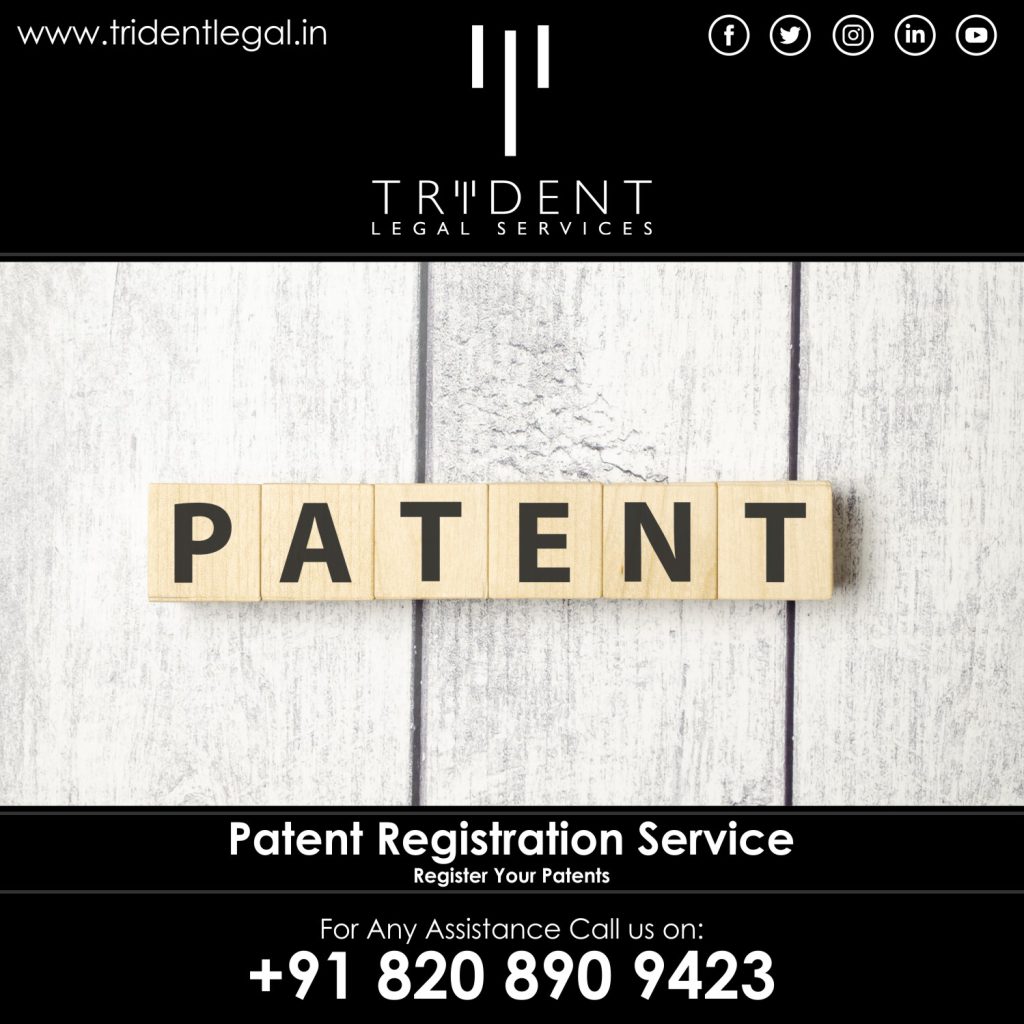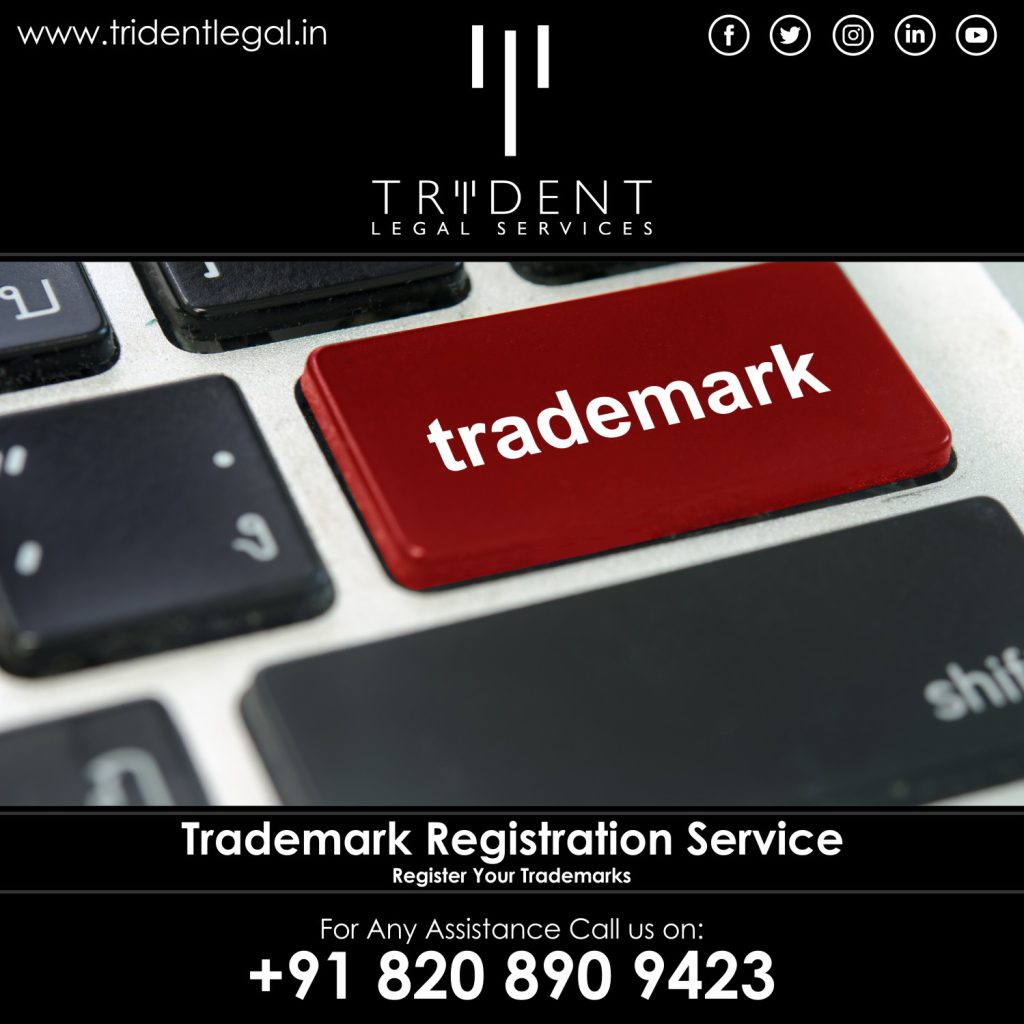Trademark Lawyer in Pune
- Guranted Expert Guidance
- Client-Centered Approach
+91 820 890 9423
desk@tridentlegal.in
Flat No. 302, Kalunkhe Niwas, Khopade Nagar, Gujaewadi, Katraj, Pune - 411041
Trademark Lawyer in Pune
- 1 Trademark Lawyer in Pune
- 2 Information on Trademark Lawyers in Pune:
- 3 How to Pick the Top Trademark Lawyer in Pune?
- 4 Trademark definition.
- 5 The two most common categories of trademarks are:
- 6 Here are a few advantages of trademark registration:
- 7 The Trade Marks Act of 1999 details:
- 8 According to the TM Act, a trademark is:
- 9 Process for Trademark Registration
- 10 Trademark Registration Documents Required:
- 11 Trademark Law in India: Recent Developments
- 12 Trademark Law in India: Amendment to the law
- 13 What Does a Pune Trademark Lawyer Do?
- 14 Trademark Law: Its Significance :
- 15 What Justifies Your Selection of Trident Legal?
- 16 Services We Provide:
- 17 Conclusion
- 18 FREQUENTLY ASKED QUESTIONS (FAQ’S) FOR TRADEMARK LAWYER IN PUNE
- 19 WHAT PEOPLE SAYS ABOUT US?
- 20 Read our latest News insights
Welcome to Trident Legal, Your Reliable Trademark Lawyer in Pune. Protecting your brand identification is essential in the fast-paced world of trade and industry. Trident Legal is aware of the importance of trademarks in creating and safeguarding your company’s distinctive identity. Advocate Nikhil Rathod is devoted to offering thorough legal help in areas relating to trademarks as the sole attorney at Trident Legal. Advocate Nikhil Rathod is your go-to Trademark Lawyer in Pune because of his in-depth knowledge of trademark laws, significant experience, and dedication to quality.
Information on Trademark Lawyers in Pune:
Advocate Nikhil Rathod has deep legal knowledge and proficiency in trademark problems. He has established himself as a top Trademark Lawyer in Pune with an outstanding track record, providing customized legal solutions to companies of all sizes. The creator of Trident Legal, he approaches each case individually to ensure that clients receive specialized attention and tactical advice.
How to Pick the Top Trademark Lawyer in Pune?
A crucial choice for your company is choosing the appropriate Trademark Lawyer. Find a trademark law expert with a solid track record, such as Advocate Nikhil Rathod, who is well-versed in the subtleties of this niche area of law. Consider their track record, reputation, and success rate while managing trademark filing and registration issues.
The following are some of the skills that a trademark attorney must possess:
- Legal expertise: A trademark attorney needs to have a solid grasp of trademark law, including the prerequisites for trademark registration, the registration procedure, and the trademark owner’s defenses.
- Strategic thinking: A trademark attorney needs to be able to consider trademark protection strategically. This includes spotting possible trademark issues, developing solutions, and defending clients in trademark conflicts.
- Effective communication: skills with clients, opposing lawyers, and judges are essential for a trademark attorney. This involves having the capacity to explain complicated legal topics succinctly.
- Problem-solving abilities: A trademark attorney needs to be able to recognize and fix trademark issues. This includes having the capacity to think creatively and develop solutions that satisfy customers’ requirements.
- Attention to detail: A trademark attorney needs to have this skill. This is crucial to ensure trademark registrations are submitted accurately, and trademark disputes are handled correctly.
- Patience: Trademark Law can be difficult and time-consuming. When navigating the trademark registration procedure and resolving trademark issues, a trademark attorney must have patience.
A trademark attorney may also require specialized knowledge in some areas of trademark law in addition to these general skills, such as:
- International trademark law: A lawyer must know international trademark law if a client wants to register a trademark across many nations.
- Internet trademark law: With more and more companies operating online, trademark attorneys need to be familiar with this area of the law.
- Trademark litigation: A lawyer representing a client in a trademark dispute must have experience in this area.
Trademark definition.
A trademark is any word, phrase, symbol, or design used to identify and set one product or service apart from another. Trademarks can be registered with the government, which grants the owner the only right to use the mark in connection with the products and services specified in the registration.
The two most common categories of trademarks are:
- Registered trademarks: Registered trademarks have a government registration. The proprietor has the sole right to employ the trademark with the products and services indicated in the registration.
- Common law trademarks: Common law trademarks do not have official registration. However, the use of common law trademarks in connection with products and services and the development of distinctiveness nonetheless qualify them for legal protection.
Trademarks are crucial for enterprises because they aid in preserving the company’s brand and goodwill. Customers can be sure they are getting the products or services they anticipate from a company when they see a trademark. Trademarks can also aid in discouraging rivals from using confusingly similar trademarks.
Here are a few advantages of trademark registration:
- Exclusive use: Following registration, the trademark owner has the sole right to use it in connection with the products and services stated in the registration. The owner’s consent is required for anyone else to use the trademark.
- Infringement prevention: Using a registered trademark can assist in stopping rivals from using logos that are confusingly similar to yours. Let’s say someone uses a trademark that is confusingly similar to a registered trademark. The registered trademark holder may then file a lawsuit against the offender for trademark infringement.
- Goodwill establishment: A registered trademark can aid in building goodwill for a company. The worth of a company’s goodwill is based on its clientele and reputation. By preventing other companies from utilizing trademarks that are confusingly similar to one another, a registered trademark can help safeguard a company’s reputation.
- Possibilities for licensing: One might grant other companies a license to use a registered trademark. This could be a way for a company to make more money without spending money making or marketing its products or services.
The Trade Marks Act of 1999 details:
The main law controlling trademarks in India is the Trade Marks Act, 1999 (TM Act). The TM Act was passed to codify and modify trademark law. The TM Act outlines the requirements for trademark registration, registered trademark protection, and the legal recourse accessible to trademark owners in the event of trademark infringement.
According to the TM Act, a trademark is:
A mark is “a device, brand, heading, label, ticket, name, signature, word, numeral, shape of goods, packaging, or combination of colors used or proposed to be used to distinguish the goods or services of one person from those of others.”
The TM Act allows for the registration of trademarks for both products and services. Suppose a trademark is not identical to or misleadingly similar to one already registered in India. In that case, it may identify any goods or services.
The TM Act also offers registered trademark protection. The exclusive use of a trademark with the products and services indicated in the registration belongs to the trademark owner. Let’s say someone employs a trademark without the owner’s consent. The registered trademark holder may then file a lawsuit against the offender for trademark infringement.
The TM Act also offers trademark owners legal recourse in the event of trademark infringement. The following are some of the remedies accessible to trademark owners:
- Injunction: A court ruling that forbids action is known as an injunction. To stop someone from using a trademark violating the owner’s trademark rights, the owner of the mark may seek an injunction.
- Damages: If someone violates a trademark owner’s rights, they may file a lawsuit for monetary compensation. A judge may grant damages to compensate for the trademark owner’s losses due to the infringement.
- Account of profits: If someone violates a trademark owner’s rights, they may also file a claim for an account of earnings. A court order known as an “account of profits” orders the trademark thief to give the trademark owner every penny they have made due to the infringement.
A complicated piece of legislation is the TM Act. Let’s say you’re thinking about trademark registration or think someone is abusing your trademark rights. You ought to speak with a trademark legal expert in that situation.
Process for Trademark Registration
The problematic procedure of trademark registration is made simple by Advocate Nikhil Rathod. He walks you through each stage of the registration procedure, from conducting exhaustive research to ensuring uniqueness to handling paperwork and submissions.
The following steps are involved in trademark registration in India:
- Pick a trademark: Picking a trademark is the first step. A trademark can exist, whether a term, phrase, symbol, or design. The trademark you select must be distinctive and unlikely to be mistaken with any existing registered trademarks.
- Conduct a trademark search: After deciding on a trademark, you should check to see if it has already been registered. You can conduct a trademark search online or through the Trademark Registry of India.
- Apply for a trademark: If your trademark has not been registered previously, you can do so with the Trademark Registry of India. Listed below are the requirements for the trademark application:
- Your desired trademark registration
- The products and services you intend to market under your brand
- The applicant’s name and address
- The time that you originally applied for the trademark;
- To determine if your trademark application satisfies the requirements for registration, the Trademark Registry of India will analyze it. You can also get a request from the Trademark Registry to update or add to your trademark application.
- Publication of the trademark application: It will appear in the Trademark Journal if approved. This offers others the chance to contest the registration of your trademark.
- Opposition to the trademark registration: If someone challenges your trademark registration, you may respond. Your trademark registration request will be rejected if the objection is upheld.
- Trademark Registration: The Trademark Registry of India will register your trademark without objections. The registration is suitable for ten years and renewable for ten years.
Trademark Registration Documents Required:
Different documents are necessary for trademark registration in India, depending on the type of trademark you are filing. However, the following standard documents are needed:
- Trademark application form: This form must be filled out in English and must contain the following details:
- Your desired trademark registration
- The products and services you intend to market under your brand
- The applicant’s name and address
- The time that you originally applied for the trademark;
- Power of attorney: A power of attorney is required if you submit the trademark application on someone else’s behalf. The person granting you the right to submit the trademark application must execute a power of attorney.
- Certified copy of the trademark registration certificate: This document is required if you register a trademark already registered in another nation.
- Trademark search report: This document reveals whether or not the trademark you intend to register is already registered in India. The Trademark Registry of India or a private trademark search company can provide a trademark search report.
- The applicant’s identity and address must be verified. This can be done by providing a passport, driver’s license, voter ID card, or official identification. Additional address documentation, such as a utility bill or bank statement, is required.
You want to register a logo or other design as a trademark. In that instance, you might also be needed to submit a sketch of the logo or design.
Although the documentation process can be intimidating, Trident Legal’s experience makes it simple. Proof of business, identification, a trademark representation, and a completed Form-48 are all required paperwork.
Trademark Law in India: Recent Developments
- Trademark Registry of India introduces a new online trademark registration site: The Trademark Registry of India has introduced a new online trademark registration portal. The new portal aims to speed up and simplify the trademark registration procedure.
- Indian Supreme Court supports “Google” trademark registration: The Indian Supreme Court has sustained registering the word “Google” as a trademark. According to the court, the word mark “Google” is distinctive and unlikely to be confused with any other registered trademarks.
- Delhi High Court issues interim injunction to stop use of “Flipkart” trademark: The Delhi High Court issued an interim injunction to stop using the “Flipkart” brand. According to the court, the name “Flipkart” is distinctive and is likely to be mistaken for it.
The Trademark Registry of India has published guidelines for trademark registration.
- Trademark Registry of India provides recommendations on trademark registration for cryptocurrency. According to the rules, cryptocurrencies must be registered as trademarks and adhere to specific criteria.
- Trademark Registry of India provides rules for trademark registration for non-fungible tokens (NFTs): The Trademark Registry of India has released guidelines for trademark registration for non-fungible tokens (NFTs). NFTs can register as trademarks according to the standards but must adhere to specific criteria.
Trademark Law in India: Amendment to the law
In recent years, India’s trademark law has undergone some revisions. The following are a few of the most notable changes:
- The Trade Marks Act, 1999 (Amendment) Act, 2010, which amended the Trade Marks Act, 1999, introduced several improvements. The amendment act safeguarded well-known trademarks and introduced rules for registering trademarks for goods and services in the digital sphere.
- The Trademarks (Amendment) Rules, 2017, which amended the Trademark Rules, 2002, introduced some adjustments. The amended rules provided faster trademark registration for some goods and services and options for online trademark application filing.
- The Trademarks amended the Trademark Marks Act of 1999 (Amendment) of 2020. In addition to protecting trademarks from cybersquatting, the amendment act established provisions for registering trademarks for geographical indications.
- The Trademarks (Amendment) Rules, 2021: These rules amended the Trademark Rules, 2002, in some ways. The modification rules allowed for the electronic filing of trademark applications and facilities for submitting trademark applications in Hindi.
- These are only a few of the changes to Indian trademark law. Thus, Recent advancements in trademark law may impact the protection of trademarks in India. It is crucial to stay up to speed on them.
What Does a Pune Trademark Lawyer Do?
Trademark registration, renewal, protection, litigation, and legal consultation are just some of the services offered by Advocate Nikhil Rathod. His comprehensive knowledge of trademark law protects the integrity of your brand.
Trademark Law: Its Significance :
Trademark legislation is essential for preserving customer confidence, protecting brands, and prohibiting unauthorized use. It defends your brand against piracy and preserves your distinctive market positioning.
What Justifies Your Selection of Trident Legal?
Trident Legal stands out for its individualized approach, legal acumen, and client-centric culture under the direction of Advocate Nikhil Rathod. Our goal is to preserve your brand by assisting you as you navigate the intricate world of trademark law.
Services We Provide:
Conclusion
Protecting your brand’s identity in a cutthroat market is essential. Your go-to Trademark Lawyer in Pune, Advocate Nikhil Rathod, is available to provide legal insight and practical advice. Your brand will remain recognizable and secure thanks to Trident Legal’s dedication to quality and Advocate Nikhil Rathod’s experience. To start a road toward legal empowerment and trademark protection, get in touch with us right away.
Contact information
Location: 411041 Khopade Nagar, Katraj, Pune
Phone: +91-820-890-9423
Email address: desk@tridentlegal.in
FREQUENTLY ASKED QUESTIONS (FAQ’S) FOR TRADEMARK LAWYER IN PUNE
What's the role of a Trademark Lawyer?
A Trademark Lawyer specializes in trademark law, assisting clients in registering, protecting, enforcing, and managing their trademarks. They provide legal expertise to ensure your brand's identity remains secure.
How can a Trademark Lawyer help my business?
A Trademark Lawyer can guide you through the complex process of trademark registration, help you navigate legal disputes, offer strategic advice on trademark protection, and ensure compliance with trademark laws.
Can I register a trademark without a lawyer's assistance?
While it's possible to attempt trademark registration on your own, hiring a Trademark Lawyer can significantly increase your chances of success by navigating potential pitfalls, conducting thorough searches, and ensuring proper documentation.
What is the significance of trademark searches?
Conducting trademark searches is crucial to avoid potential conflicts with existing trademarks. A Trademark Lawyer can help identify similar marks and guide you on the uniqueness of your proposed trademark.
How long does the trademark registration process take?
The timeline can vary, but it usually takes around 18-24 months for the entire process, including application filing, examination, publication, and registration. A Trademark Lawyer can provide a more accurate estimate based on your case.
What if someone infringes on my trademark rights?
If your trademark is infringed upon, a Trademark Lawyer can help you enforce your rights by sending cease and desist letters, negotiating settlements, and if necessary, pursuing legal action to protect your brand.
Can I trademark a domain name?
Yes, domain names can be trademarked if they meet certain criteria, like distinctiveness and association with your goods or services. A Trademark Lawyer can guide you through the process of protecting your online presence.
What's the difference between ™ and ® symbols?
The ™ symbol indicates unregistered trademark use, while the ® symbol signifies a registered trademark. A Trademark Lawyer can advise you on when and how to use these symbols to assert your rights.
Can I trademark a slogan or a sound?
Yes, slogans, sounds, and even specific color combinations can be trademarked if they fulfill the requirements for distinctiveness and associability with your brand. A Trademark Lawyer can help determine the eligibility of such trademarks.
Why should I choose a Trademark Lawyer at Trident Legal?
Advocate Nikhil Rathod at Trident Legal possesses a deep understanding of trademark law, offering personalized attention and tailored legal strategies. With an unwavering commitment to your brand's protection, he ensures your trademarks are in capable hands.
WHAT PEOPLE SAYS ABOUT US?
I was really impressed with Trident Legal and Advocate Nikhil Rathod. Even though they just started,
Deepak Joshi
Trident Legal and Advocate Nikhil Rathod are really good at what they do. Even though they
Arjun Mehta
I had a great experience with Trident Legal and Advocate Nikhil Rathod. Even though they are
Preeti Mishra
Trident Legal, with Advocate Nikhil Rathod, is like a rising star in the legal world. I
Ritu Singh
I was lucky to work with Trident Legal and Advocate Nikhil Rathod. Even though they just
Prakash Gupta
Trident Legal and Advocate Nikhil Rathod are really amazing! They helped me with legal stuff and
Meera Patel
Trident Legal and Advocate Nikhil Rathod are like superheroes! They are really good at legal stuff
Rohit Verma
I wasn’t sure about Trident Legal because they are new, but they surprised me! Advocate Nikhil
Anjali Sharma
I had the honor of working with Trident Legal and Advocate Nikhil Rathod. They were really
Rakesh Kumar
Rakesh KumarTrident Legal, led by Advocate Nikhil Rathod, is like a superhero in the legal world. Even
Nisha Gupta











